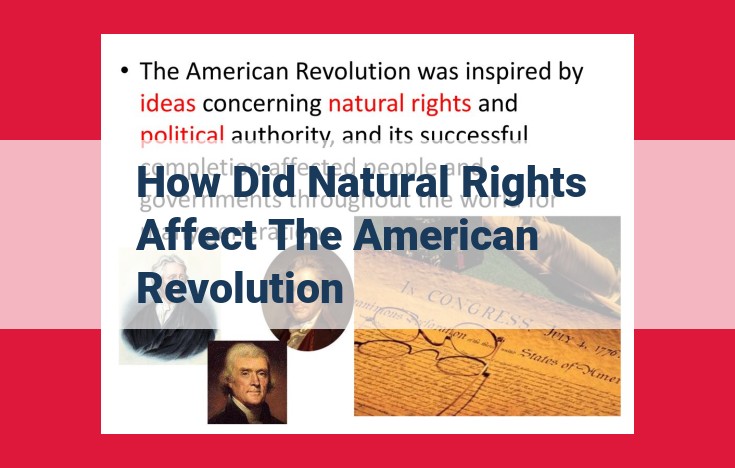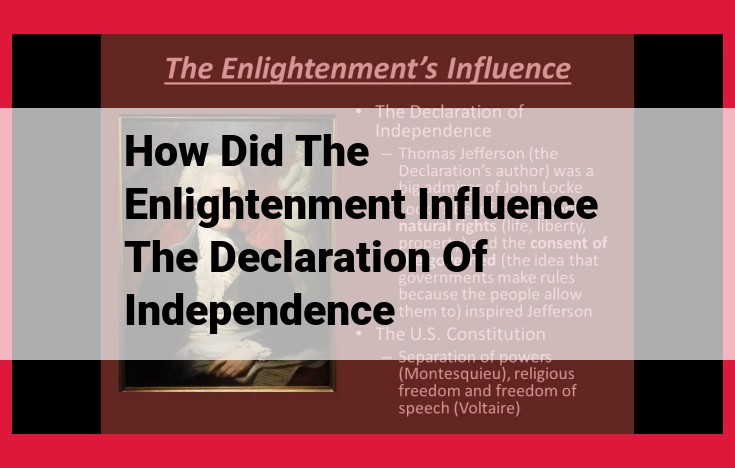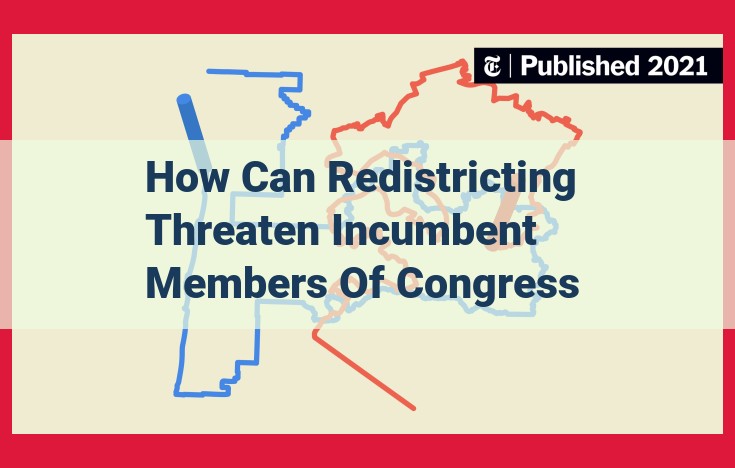Natural rights played a pivotal role in the American Revolution by providing a philosophical and moral justification for rebellion. Inspired by Enlightenment thinkers, American colonists believed they possessed inalienable rights, including life, liberty, and property, that were inherent and could not be taken away by the government. When these rights were perceived to be violated by British policies such as taxation without representation, colonists invoked natural rights to argue for their independence.
The Philosophical Roots of Revolution
In the tapestry of history, the seeds of revolution are often sown in the fertile soil of philosophy. John Locke, Thomas Hobbes, and Jean-Jacques Rousseau, three titans of political thought, laid the intellectual groundwork for the transformative movements that would ignite the spark of change.
John Locke: Locke’s belief in natural rights and the social contract became cornerstones of revolutionary ideology. He argued that individuals possess inherent rights to life, liberty, and property, which no government could rightfully abrogate. The government’s power, he contended, was derived from the consent of the governed, and if it violated those rights, the people had a duty to overthrow it.
Thomas Hobbes: Hobbes’s pessimistic view of human nature led him to envision a strong central authority as necessary for maintaining order. However, he also recognized the inherent danger of such power and emphasized the importance of checks and balances to prevent tyranny.
Jean-Jacques Rousseau: Rousseau’s concept of the general will proposed that individual and societal goals could be harmoniously aligned. He believed that true freedom lay not in unchecked individual liberty but in the collective expression of the community’s will. This idea would later inspire the slogan of the French Revolution: “Liberty, Equality, Fraternity.”
These philosophical strands coalesced in the minds of revolutionary thinkers, providing them with a framework for understanding political oppression and envisioning a more just and equitable society. Their ideas would reverberate through the halls of time, shaping the course of human history forever.
Historical Leaders Who Shaped the Movement
At the heart of any historical movement lie the individuals who ignite its flame and shape its course. In the pursuit of liberty, equality, and self-determination, certain leaders emerged as beacons of inspiration, guiding their compatriots towards a brighter future. Three such luminaries—Thomas Jefferson, Samuel Adams, and Patrick Henry—played pivotal roles in giving life to these ideals.
Thomas Jefferson: The Pen and the Sword
Jefferson’s intellect and eloquent pen became formidable weapons in the struggle for independence. As the primary author of the Declaration of Independence, he eloquently articulated the unalienable rights of man and the principles of representative government. His ideas reverberated across the colonies, providing the ideological foundation for the American Revolution.
Samuel Adams: The Voice of the People
Adams was a fervent advocate for popular sovereignty and the “consent of the governed”. He organized grassroots resistance against British tyranny, rallying the citizens of Boston and beyond. His fiery speeches and skillful political maneuvering helped galvanize support for independence.
Patrick Henry: The Firebrand of Revolution
Henry’s eloquence and impassioned speeches ignited the revolutionary spirit in Virginia. His famous “Give me liberty, or give me death!” speech at the Second Virginia Convention stirred the hearts of his listeners, pushing them closer to the brink of armed resistance. His fiery rhetoric set the stage for the Battles of Lexington and Concord, the opening salvoes of the American Revolution.
These historical leaders were not merely figures from a bygone era; their ideas and actions continue to inspire and resonate with us today. Their legacy reminds us of the power of individual conviction and the transformative potential of collective action in the pursuit of freedom and self-governance.
Landmark Documents: The Foundation of American Ideology
The Declaration of Independence: A Manifesto of Freedom
The Declaration of Independence, drafted by Thomas Jefferson in 1776, was a bold proclamation against British tyranny. It asserted the unalienable rights of all individuals to life, liberty, and the pursuit of happiness. Its powerful words resonated with Americans, galvanizing them to fight for their freedoms.
The Bill of Rights: A Shield against Government Overreach
In the aftermath of the American Revolution, the Bill of Rights was ratified in 1791 to guarantee fundamental freedoms for citizens. These ten amendments prohibit unreasonable searches and seizures, protect freedom of speech and religion, and ensure the right to due process of law. They serve as a bulwark against government overreach and are considered the cornerstone of individual liberty in the United States.
The Significance of Foundational Documents
These foundational documents are not merely pieces of parchment; they are living legacies that have shaped the American ethos. They articulate the ideals of self-governance, limited government, and the inherent dignity of all individuals. They continue to inspire generations of Americans and serve as a reminder of the principles upon which our nation was founded.
Core Concepts: The Bedrock of Enlightenment Ideals
At the heart of the Enlightenment, an intellectual and political movement that swept across Europe in the 17th and 18th centuries, lay fundamental concepts that shaped its revolutionary ideas and enduring legacy. These concepts provided a philosophical and moral foundation for challenging the prevailing order and envisioning a more just and equitable society.
Natural Rights: A Birthright Granted by Nature
Enlightenment thinkers posited that natural rights are inherent and inalienable rights bestowed upon every human being simply by virtue of their existence. These rights, which include life, liberty, and the pursuit of happiness, are considered sacred and inviolable, existing independently of any government or social contract.
Inalienable Rights: Immutable Rights That Cannot Be Surrendered
Inalienable rights are an extension of natural rights. Philosophers argued that these rights are inalienable, meaning they cannot be transferred, surrendered, or revoked by any authority. They represent the essential and inherent dignity of human beings and serve as a bulwark against tyranny and oppression.
Social Contract: A Bargain Between Citizens and Government
The social contract is a foundational concept that underlies the relationship between individuals and the state. It proposes that government is not a divine right but rather a covenant between citizens who voluntarily agree to surrender certain freedoms in exchange for protection and the maintenance of order. The government, in turn, is bound to respect and uphold the natural rights of its citizens.
Enlightenment: The Dawn of Reason and Progress
The term Enlightenment encapsulates the spirit of the movement. It signified a rejection of superstition, dogma, and blind obedience. Instead, Enlightenment thinkers embraced reason and rationality as the guiding principles for understanding the world and improving human society. They believed in the power of education, science, and the arts to unlock human potential and usher in an era of progress and enlightenment.
Historical Events that Impacted the Topic: Discuss pivotal historical events such as the American Revolution, Boston Tea Party, and Battles of Lexington and Concord that shaped the development of the topic.
Historical Events that Shaped **Enlightenment’s Legacy**
The Enlightenment, a pivotal era in human history, was marked by a profound shift in thought, emphasizing reason, individualism, and natural rights. This intellectual revolution deeply impacted subsequent historical developments, laying the foundation for modern democratic societies.
One of the most influential events in shaping the Enlightenment’s legacy was the American Revolution. This conflict erupted when British colonists in North America, inspired by Enlightenment ideals, revolted against oppressive rule. The Declaration of Independence, drafted by Thomas Jefferson, eloquently proclaimed the inalienable rights of life, liberty, and the pursuit of happiness. This document became a beacon of hope for freedom-loving people worldwide.
The Boston Tea Party, a daring act of defiance, further fueled the American Revolution. Protesting British taxation without representation, colonists dumped a massive shipment of tea into Boston Harbor. This audacious act symbolized their determination to resist tyranny and establish their own government based on the principles of Enlightenment.
The Battles of Lexington and Concord, the opening engagements of the American Revolutionary War, testified to the colonists’ unwavering commitment to self-determination. Faced with overwhelming British forces, they fought valiantly, proving that the Enlightenment’s ideals could inspire ordinary people to stand up for their beliefs.
These historical events were not merely isolated incidents but catalysts for profound societal change. Their impact extended far beyond the borders of the United States, inspiring revolutions and constitutional reforms across Europe and other parts of the world. The Enlightenment’s legacy, shaped by such pivotal events, continues to form the bedrock of modern democratic principles and the pursuit of human rights.
Influential Political Ideas that Shaped the Topic
In the realm of political philosophy, the topic we delve into has been profoundly influenced by a constellation of groundbreaking ideas that have left an indelible mark on human history. Among these ideas, three stand out as towering beacons of Enlightenment thought: representative government, consent of the governed, and limited government.
Representative government emerged as a direct response to the widespread dissatisfaction with monarchical rule. This radical concept proposed that citizens should have a say in the decisions that govern their lives, not merely through the whims of a single sovereign, but through elected representatives who would act on their behalf. It was a resounding call for popular sovereignty, where the power ultimately resides in the hands of the people.
Consent of the governed is the bedrock upon which legitimate authority rests. This idea asserts that governments can only govern with the explicit consent of those they rule. Without this consent, the government’s authority is considered to be illegitimate and unjust. This principle places immense importance on the social contract, which is an implied agreement between citizens and the government, where citizens surrender some of their freedoms in exchange for protection and the benefits of organized society.
Limited government is the cornerstone of a free and democratic society. It posits that the government’s power should be strictly circumscribed and subject to checks and balances, preventing it from becoming tyrannical. This idea recognizes that excessive government power can lead to the erosion of individual rights and the suppression of dissent. By limiting the government’s reach, citizens are empowered to protect their liberty and ensure that their government remains accountable to their will.
These political ideas, intertwined with the Enlightenment’s emphasis on reason, individual rights, and human dignity, have profoundly shaped the topic we are exploring. They have served as the guiding principles for countless revolutions, constitutions, and declarations of independence, and continue to inform our understanding of the relationship between citizens and their governments.
Key Terms in the Philosophy of Liberty
As we navigate the intricate tapestry of political thought, it’s essential to grasp the fundamental concepts that have shaped the ideas of liberty, equality, property, and self-determination. These terms form the backbone of our modern understanding of freedom and human rights, but their meanings have evolved over centuries of philosophical inquiry.
Liberty: The Inalienable Right to Live
Liberty stands as the cornerstone of democratic societies, embodying the inherent right of individuals to live their lives as they choose, free from arbitrary interference or coercion. It is not a gift bestowed by the government but an intrinsic quality of being human.
Equality: A Common Birthright
The concept of equality recognizes the inherent worth and dignity of all individuals, regardless of race, gender, religion, or any other distinction. It is not about making everyone identical but about creating a society where everyone has equal opportunities and access to basic rights and freedoms.
Property: A Foundation of Independence
Property encompasses not only physical possessions but also intellectual and creative endeavors. It represents the fruits of our labor and is crucial for our economic well-being and personal autonomy. The right to property incentivizes hard work and innovation, while also providing a stable foundation for social and economic growth.
Self-Determination: The Power Within
Self-determination empowers individuals to make decisions about their lives without external coercion. It encompasses the right to autonomy over our bodies, our thoughts, and our future. This fundamental principle recognizes the inherent capacity of individuals to shape their own destinies.




